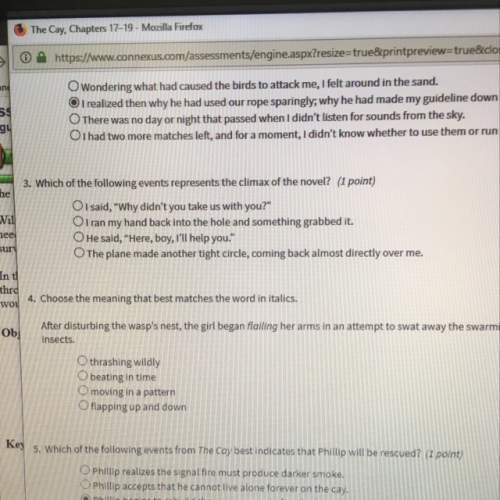
Answers: 3


Another question on English

English, 21.06.2019 19:10
Lauses unnecessary to the meanings of the words modified demonstrative 2. clauses necessary to the meanings of the words modified relative 3. words for which pronouns stand intensive 4. a pronoun ending in -self and referring to the previously used noun or pronoun nonrestrictive clauses 5. a pronoun ending in -self and used for emphasis restrictive clauses 6. pronouns that ask questions indefinite pronouns 7. pronouns that point out to whom or to what the speaker is referring reflexive 8. everyone, nobody, and something are examples antecedents 9. pronouns introducing adjective or noun clauses interrogative 10. i, you, him, mine, and their are examples personal pronouns
Answers: 2

English, 21.06.2019 21:00
Which character is mainly focused on in to kill a mockingbird?
Answers: 2

English, 21.06.2019 21:20
Read the sentences below and complete the instruction that follows. the coach, who has ten years' experience, has agreed to lead our team. the coach who has ten years' experience has agreed to lead our team. select the answer that explains the difference between the two sentences, as well as the purpose each clause serves for the benefit of the reader. a.) the first sentence contains a noun clause that functions as a predicate nominative; therefore, it renames the subject of the sentence for the reader. the second sentence contains an essential adjective clause that modifies the noun "coach"; therefore, it clarifies for the reader which coach is being discussed. b.) the first sentence contains a nonessential adjective clause that modifies the noun "coach"; therefore, it provides the reader with interesting details about the subject of the sentence. the second sentence contains an essential adjective clause that modifies the noun "coach"; therefore, it clarifies for the reader which coach is being discussed. c.) the first sentence contains a nonessential adjective clause that modifies the noun "coach"; therefore, it provides the reader with interesting details about the subject of the sentence. the second sentence contains a noun clause that functions as a predicate nominative; therefore, it renames the subject of the sentence for the reader. d.) the first sentence contains an adverb clause that modifies the verb "agreed"; therefore, it provides the reader with the answer to the question "when." the second sentence contains an essential adjective clause that modifies the noun "coach"; therefore, it clarifies for the reader which coach is being discussed.
Answers: 1

English, 21.06.2019 23:30
Buck did not cry out. he did not check himself, but drove in upon spitz, shoulder to shoulder, so hard that he missed the throat. they rolled over and over in the powdery snow. spitz gained his feet almost as though he had not been overthrown, slashing buck down the shoulder and leaping clear. twice his teeth clipped together, like the steel jaws of a trap, as he backed away for better footing, with lean and lifting lips that writhed and snarled. read this passage. explain what the conflict shows about buck and spitz.
Answers: 1
You know the right answer?
Why is it bad to jump to conclusions?...
Questions










Advanced Placement (AP), 13.09.2019 18:30




Mathematics, 13.09.2019 18:30




Mathematics, 13.09.2019 18:30

Physics, 13.09.2019 18:30




